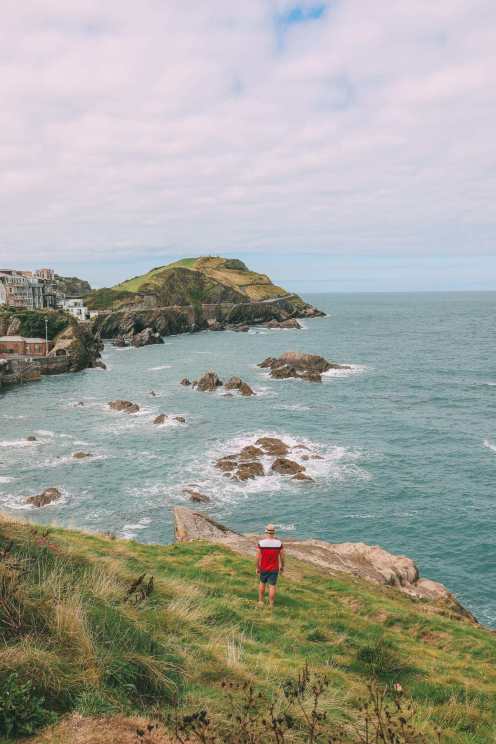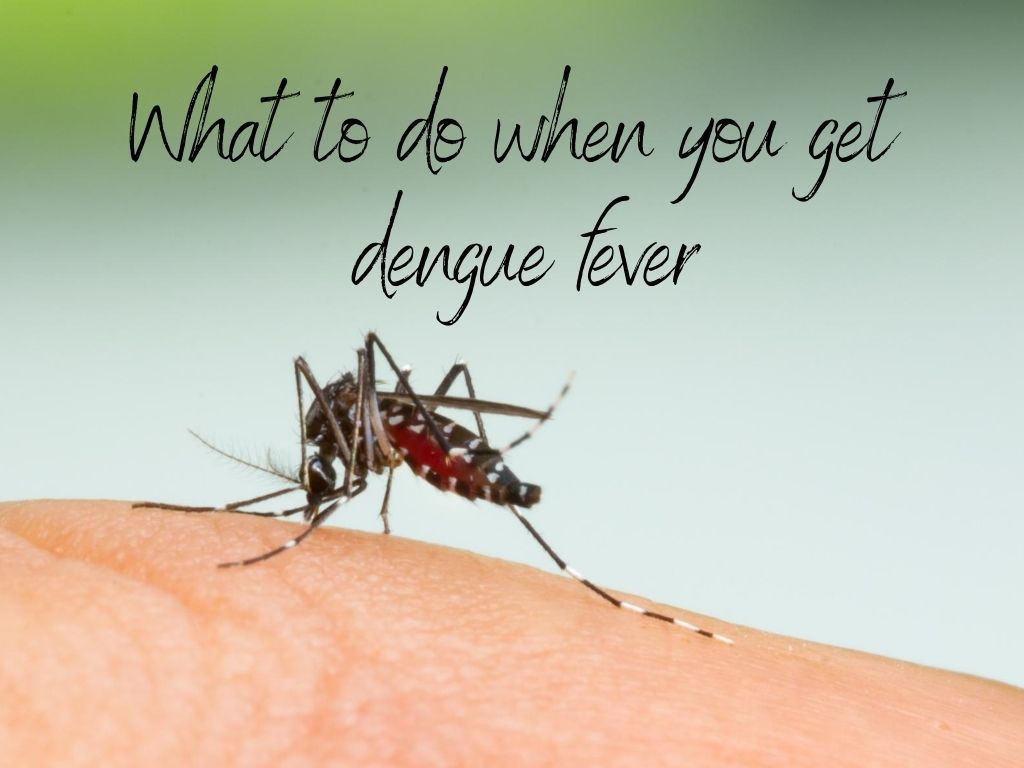
“It’s probably strep throat. A course of antibiotics will clear it up.” That was the initial diagnosis I got from the doc and I don’t blame him for thinking I was dengue-free. After all, I wasn’t displaying the main symptoms. Plus, my rash, tucked under my suntanned(ish) skin could only be seen by me because I knew my skin didn’t normally look like that.
That bit is simple…
CDC (USA Health Service)
And it can be deadly.
It was a message from my Mexican friend. I was lying prone for the 5th day in a row, each day feeling increasingly more ill but ever convinced I could shake off whatever it was that had felled me, provided I just stayed still.
Do not take that as licence to go out and get as many dengue bites as possible. There is a significant risk that repeat dengue infections will be more severe. Which brings me on to the fact that as well as being 4 types of dengue, there are 2 levels of severity – normal dengue and severe dengue.
Why wouldn’t you just go to a doctor if you get sick, we said.
The most significant piece of advice when you have dengue is don’t take any NSAID based medication like ibuprofen or aspirin to treat your pain. With words like leaky cells and bloodstream and haemorrhaging flying around, you’ll understand why you shouldn’t take pills that thin your blood.
Don’t be like me. Don’t let the ‘flu-like-symptoms’ of dengue (and Malaria) slip from your mind. Had I not been in contact with my Mexican friend, cancelling one coffee date or lunch date after another, I honestly don’t think the words dengue fever would have crossed my mind. I’ve listed the main dengue symptoms above. As a reminder they are:
Dengue has three phases – febrile, critical and recovery. I’ll also add to the list some other key timings:
But most of all, I felt too sick to get to a doctor, which is what convinced me to go. If I really was too ill to arrange and then go visit a doctor, I was sick enough to need one.
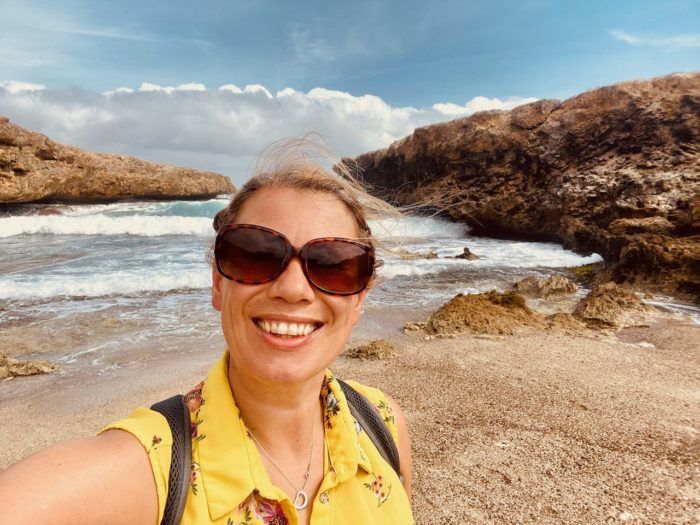
The problem was, over the last decade I’d been popping in and out of tropical destinations like they were my very own English back garden. Somewhere along the way – and across the years – those initial fears about malaria, dengue and all things falling into the category of exotic diseases fell off my fear radar and eventually entirely out of my mind. I mean, you go and dice with the tropics and keep coming back unharmed and you stop thinking of them as potentially lethal.
15. Try not to freak out about mosquito bites
In practice: I’ve taken this advice. It does not work. The idea is that the vitamin B repulses mosquitoes (it doesn’t). As for the tonic water, this possibly used to work when tonic water contained lots of quinine (also thought to repel mosquitoes) but most tonic water no longer contains more than a trace of quinine.
“What are the symptoms of dengue?”
I also rustled up a latent piece of knowledge: Dengue Fever was otherwise known as break bone fever and my pain was in my muscles, not my bones.
- High fever? Nope.
- Severe headache? Not me…though my cold had started with a migraine (something I’m unfortunately familiar with).
- Pain behind the eyes? Also no (discounting the migraine).
- Severe joint and muscle pain? Define severe. I was in pain definitely. And it was getting worse by the day. Bad enough to make me wake up at 4 a.m. and take pain pills…ok, maybe that was severe.
- Fatigue? Every day since my mum died at the beginning of the year.
- Nausea? Now you come to mention it I’d lost my appetite and that NEVER happens.
- Rash? I looked down at my body.
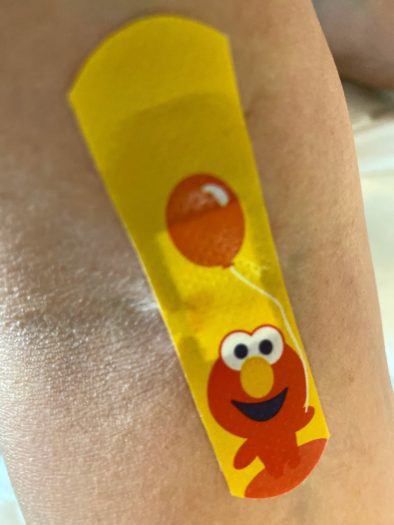
I’ve explained above what dengue was like for me. What I found interesting is that some of the symptoms got worse as I got better (the body aches) and it wasn’t until after the dengue was inactive in my body that I got the severe headache that is a prime indicator of the virus.
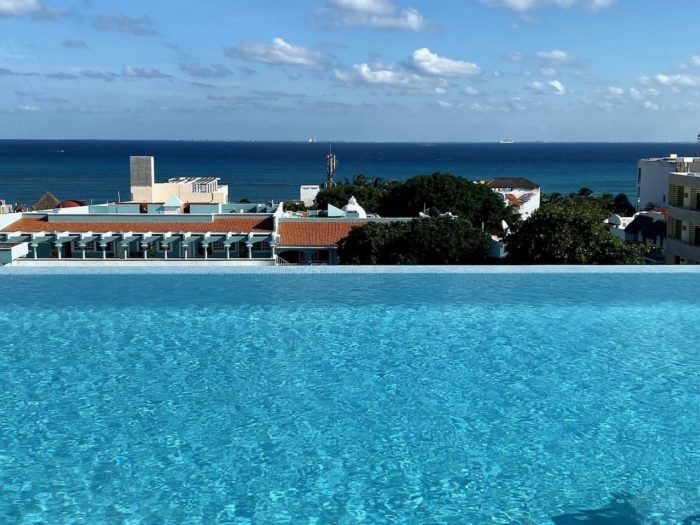
The advice: wear long-sleeved tops and trousers at sunrise and sunset
Before I became a complacent traveller, forgetting that dengue existed, I used to be terrified of getting dengue, more so than malaria, because there is no treatment for dengue. I thought dengue = death or at least getting pretty close to it. I know now that isn’t the case but still, dengue is a serious illness and needs to be taken seriously.
Note: I’m a travel blogger, not a doctor. What’s in this post is a blend of what I’ve learned while extensively researching dengue fever while I was suffering with the illness. And some extra research I’ve done writing this post. I’m not an expert so always go with your doctor’s advice, not some random on the internet (but you knew that already, right?)
My advice: Avoid gimmicks. There is zero scientific evidence that they work. Save your money and your health.
What is dengue fever?
Tip: a good way to check you’re getting enough water is to check your pee – it should be close to clear. If it’s not, drink more. And, no, caffeinated drinks like tea, coffee and coke don’t count. In fact, they’re dehydrating.
Where are you at risk of getting dengue fever?
In practice: I struggle with this advice for several reasons:
Wear long clothes? I’ve been bitten through them too. If you have the blood they want, they ALWAYS find a way in. Especially when you sleep.Where did I get dengue fever?
(Some good news: for 2-3 months after you get any type of dengue, you have immunity for all dengue. That gradually fades and you’re left with immunity for just your type).
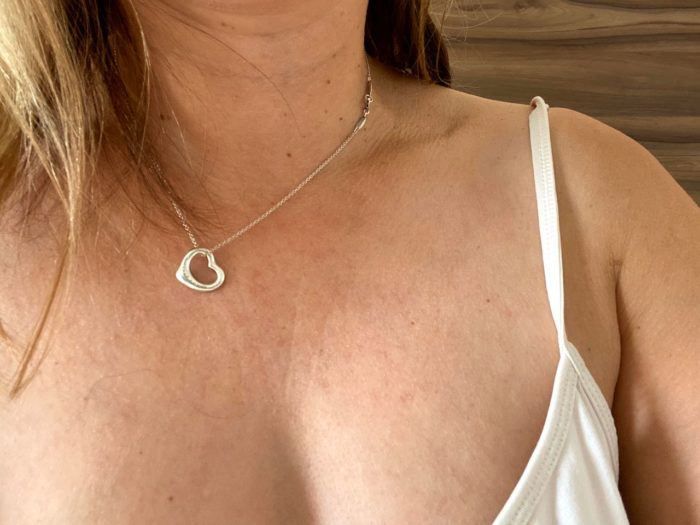
What dengue fever was like for me

I’ve based this list on the NHS (UK health service) list of dengue symptoms. Other trustworthy websites I used with dengue symptom information include:
What to do if you get dengue fever when you travel?
Fortunately (?) I felt sick enough that this wasn’t a realistic option, as tempting as it was. So, I made myself a promise that I’d put my travel plans on hold until I got the all clear from the doc. This, after all, was the very reason I had travel insurance.
Web MD
The better and more practical news for getting treatment: your doctor will tell you exactly what to do. And NOT do. Speaking of which…
1. Be familiar with the symptoms of dengue fever

It’s hard to attribute a specific mosquito bite to the virus but based on the lifespan of dengue and my travel itinerary, I’m 100% certain that I got dengue while I was in the very popular tourist destination of Playa del Carmen in Mexico. Please don’t freak out if you are planning to visit. I’ve visited Playa del Carmen several times and was just fine. I have some dengue prevention tips below if you’re reading this before you travel.
- Fever
- Severe headache
- Pain behind the eyes
- Muscle or joint pain
- Nausea or lost appetite
- Vomiting
- Red rash on your body
Here’s my tips for what to do if you get dengue fever when you travel.
It. Couldn’t. Be. Dengue.
I worked through the list of the most common dengue symptoms:
I thought you might want a quick low-down on what dengue fever was like for me. Keep in mind that every single human is different so this won’t help you in any real way determine if you have dengue or not. Only a blood test can do that.
Dengue is most common in tropical regions including South and Central America, the Caribbean, Africa, Southeast Asia, India and the Pacific Islands. But don’t be fooled. As the global temperature rises, dengue is spreading. There have been outbreaks in Florida, France and Australia. In fact, it infects around 390 million people per year.
2. Then (kind of) ignore the list of dengue symptoms
Let’s take a look at the common advice and how it fares in practice:
I wasn’t just bereft of appetite, I could barely walk through the hotel lobby during breakfast hours without wanting to vomit and the entire city seemed filled with the fug of food fumes. For days, I didn’t open a window, lest a stray whiff of fried foods waft in. Yet, I knew I needed to eat.
After I was tested and dengue was confirmed, my doctor explained how, in the past few years, the symptoms had started to change and it was becoming harder to give a ‘probably dengue’ diagnosis based on the symptoms alone. A friend of a friend had also experienced dengue FEVER without getting a fever and several personal stories I read online said the same thing.
I will try harder – more DEET, more often, especially in at risk places (geographically and on my person). But I won’t let it rule my life or ruin my travels
I’ve learned a lot about antibiotics over the past few years and how terrible they are for your body. Yet we pop them like they’re candy whenever a doctor mentions them. What most people don’t realise is that these ‘health restoring’ pills can do more harm than good by wiping out not just the bad bugs but all your good ones, too. And in recent years, our global prevalence for popping pills has helped lethal bugs to mutate, thrive and become resistant to the pills we take. This antibiotic resistance contributed to the death of my mum. I’ve since sworn to avoid them unless it really is a life or death situation. And I certainly wasn’t going to take antibiotics based on a ‘probably’.
3. Visit a doctor (even if you think you’re wasting their time)
What if you’ve been taking blood thinners/NSAIDs and then find out that you have dengue fever?
Earlier in the year, I had a conversation with a friend about parents and how frustrating (and worrying) it is when they get sick but don’t go and see a doctor. Often, by the time they get medical help, the symptoms and underlying issues are more severe and harder to treat. It happened with my mum. And it happened with my friend’s mum.
My advice: book a room where you can close the windows and use A/C. Personally, I hate breathing fake air all night but that’s the best way of ensuring a mosquito-free sleep.
“It’s not that bad.” I replied.
Of course I was tired. My body was aching because of the sport. It wasn’t dengue.
In practice: If you’re relying on a hotel’s mosquito net, pack duct tape because I guarantee that there will be at least one mosquito-sized hole in it.
My advice: use mosquito repellent containing a high level of DEET unless you want to reapply regularly. I use 100 Deet by Off (Deep Woods range). But appreciate that there is always a risk of getting bitten (eye lids, your posterior when you go the loo). Read my article on the best mosquito repellents here. Note: I wasn’t following my own good advice and had no DEET on when I got dengue.
Tips on how to find a doctor when you’re sick overseas:
This is where the internet got thin and the wonderful ladies in my Facebook travel network jumped in. The web will tell you that dengue symptoms can last up to six months. What it doesn’t tell you is which symptoms, how severe they will be, how long they are likely to last and what can realistically be expected if you’re not operating on a normal work-home-sleep-repeat routine.
- speak to your accommodation provider – some hotels have doctors who can visit your room. I once had a hostel arrange a taxi to take me to their recommended doctor.
- ask your local contacts if they have any suggestions – unfortunately my friend’s doctor was too far away for me.
- check ex-pat groups on Facebook – this is where I found my Dengue Doctor – I read a past post from someone who’d been sick in the city I was in. There were several ‘he’s great’ and ‘sorted me out’ comments.
- use Google – taking the doctor recommendation from the ex-pat group, I did a quick look for reviews and found out (to my delight) that he was a 2-block walk away.
- use online messaging – I was also very pleased that I could WhatsApp the doctor from my prone position. I got an instant reply and in under a few messages I’d found out that he was open, could see me as soon as I got there. I even got a price. He would have done a hotel room visit but I decided to go to him. Partly because I didn’t want to add ‘invite strange man I’ve found on the Internet to my hotel room’ to my list of regrets. Equally, I was convinced that if I could make it to the doctor, it would somehow prove I was not so sick after all. Idiot.
- another option is to call your travel insurance. I did this the day after I found out I had dengue (because a significant change of travel plans was imminent) and I also found out that the insurance has a 24 hour emergency help service. They will help you find a doctor overseas. Personally, I’d go with local advice first but if you’re really stuck, call your insurance. I’ve got more tips about travel insurance here and here.
4. Insist on a blood test to check for dengue fever

What Does Travel Insurance Include (And What’s Excluded)
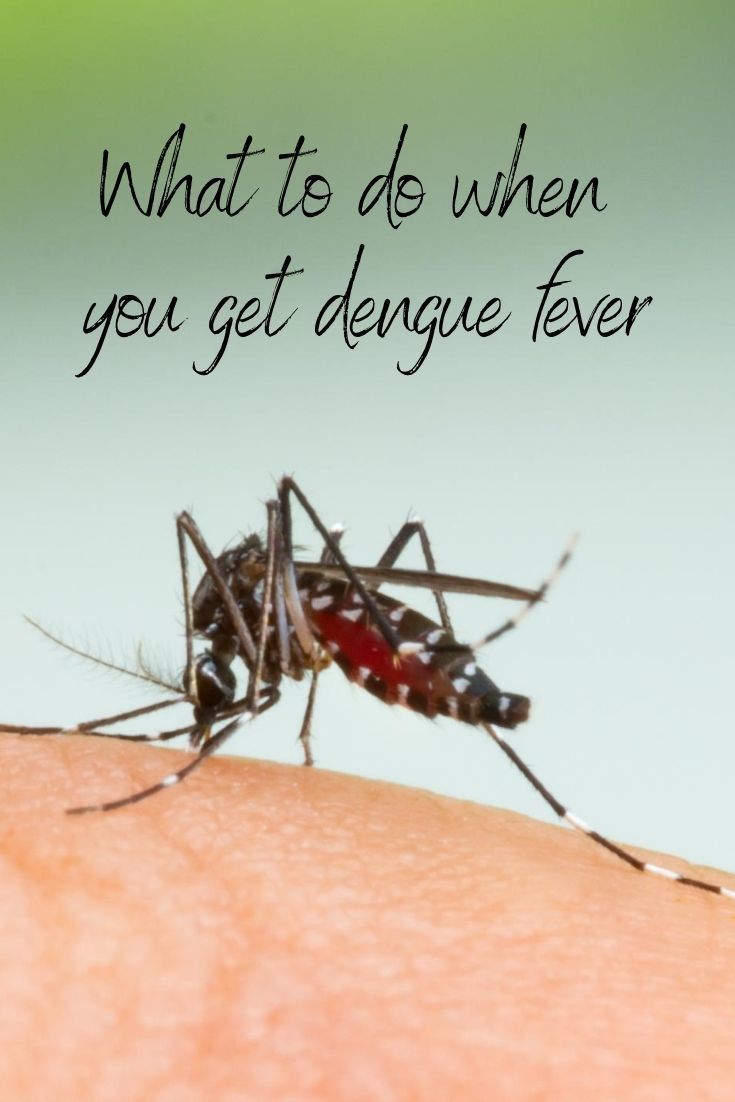
In this post I’m going to give you some practical tips for what to do it you get dengue fever (or are worried about getting dengue fever) when you travel. There is every chance that you are reading this before you have had a dengue fever diagnosis so there are some tips in here for you too. My first points being: don’t panic. There may not be a treatment but that doesn’t mean it will kill you – hey, I’m writing this just a few weeks after I had dengue fever.
“You should go to the doctor.”
I’m significantly paraphrasing from Wikipedia. You can read the more detailed explanation here.
5. Understand: what is dengue
So, that’s my guide to what to do when you get dengue fever when you travel. Got any questions, comments or personal experience to share? Let me know in the comments below.
Prevention needs to be on the list because not getting dengue in the first place is clearly the better option but I’m putting it last because a) it pissed me off reading a list of ‘how to avoid getting dengue’ tips when that ship had clearly sailed and b) as someone who has the sweet blood that mosquitoes crave, and having travelled to many tropical destinations, I know that avoiding getting bitten is not as easy as these lists make out.
It may sound obvious but when the pain is bad enough that it wakes you up in the middle of the night and you’re counting down the minutes (126 left) until you can take your next pain pill, it can be tempting to take more than you’re allowed each 24 hour period. Just an hour earlier won’t do any harm, will it?
Good(ish) news: there is now a vaccine for dengue. Not great news for travellers – it’s only available if you live in a dengue-prone region. Not great for ageing travellers like me – the vaccine is for people under 45 (hell knows why), so I only have a few years for it to go mainstream before I won’t be eligible.
The advice: drink tonic water and take Vitamin B supplements.
It’s most likely that you will only have some of the symptoms. In fact, I didn’t have the first three dengue symptoms on the list – the main three symptoms, to be precise. When I visited the doctor, he checked me over and told me that I was probably coming down with strep throat (more on that in a minute).
What happens to your body when you have dengue fever?
I heard from many travel ladies who’d suffered dengue (some had it twice) and here’s the general themes:
The good news is there are several avenues of help. Here are some options:
6. Understand the phases of dengue fever
There are four different strains of dengue, helpfully numbered dengue type 1, 2, 3 and 4. That means you can get dengue up to 4 times. When I first read that, I panicked – like I was a cat with 9 lives and had suddenly snuffed out one of them. That’s not how it works. When you get a type of dengue e.g. type 1, you then have lifetime immunity from type 1. So, if you get each type, you then have full immunity.
Once you get diagnosed with dengue, you’ll come to hear a lot about your platelet and leukocyte levels. These numbers are used to determine how severe your dengue is and where you are in the life cycle of the virus. When I had dengue fever, what I most wanted to know was how long dengue fever lasts. I scraped together this information from my doctor, the internet (most useful was actually Wikipedia) and also by chatting to a bunch of ladies in a Facebook group for female travellers. Here’s what I found out:
- Incubation period – the time between getting bitten and the symptoms showing up is between 3 to 14 days but is usually 4 to 7 days (that’s why I was certain I was bitten in Playa del Carmen – I was there for more than 2 weeks before the symptoms started).
- Febrile phase – this is when your symptoms usually appear – this usually lasts about 1 week. Honestly, I felt under the weather for about a week before the symptoms really hit (incubation period?). I then felt horrific for about a week (febrile phase). I then developed the dengue headache, which lasted a further week. I suppose this was my ‘recovery phase’.
- Critical phase – if things are going to get severe, this is when it happens and will happen during the 7 day febrile phase.
- Recovery phase – after 7 days, recovery usually occurs, provided you haven’t developed severe dengue. When the recovery stage starts is easily measured by a blood test and happens when your platelet numbers start to go back up. When they do that, the dengue virus is no longer active. The recovery stage takes about 3 days. For me, it was about a week thanks to the headache.
- Post dengue – what the medical sites are pretty bad at is talking about what happens post dengue. It can leave you feeling weak with other health issues cropping up for up to 6 months. Thanks to the many ladies who replied to my post online, I’ve learned a lot about what dengue is like (in real life, not just on a medical chart). More on this below.
9. Understand how to treat dengue when there is no treatment for dengue
12 Tips For When You Miss Your Flight
Nausea was probably one of the toughest symptoms for me. I typically graze on food, eating little and often and trying to eat as healthily as I can, even when I travel (yes, chocolate cake is in my diet but I make sure I get my fruit, veggies, lean proteins and wholegrain too). Dengue took all of that away.
My point: if you’ve been in a mosquito area, have been bitten, then feel sick, get to a doctor.
7. Stop taking ibuprofen or NSAIDs immediately
10 Times You’ll Realise the Importance of Travel Insurance
The advice: use a mosquito net
I couldn’t quite describe how I felt except that it was somewhere between a cold and flu. Not quite one (no snotty nose which I usually get with a cold) nor the other (the body aches were excruciating but felt different to flu).
8. Get regular blood tests during dengue
“I bet you’re bathing in mosquito repellent,” a friend messaged me.
10 Times Travel Made Me Sick
9. Drink water like your life depends on it (because it does)
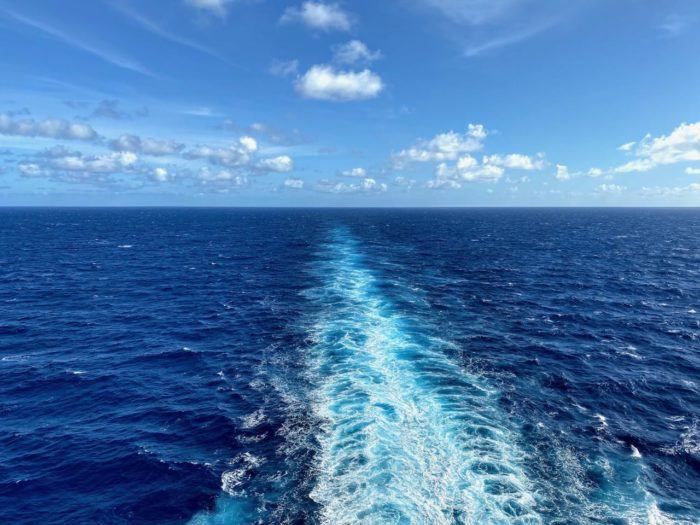
“Mosquitoes are one of the deadliest animals in the world. Their ability to carry and spread disease to humans causes millions of deaths every year.” – World Health Organisation
In practice: This is good advice but it is incomplete advice. Not all repellents are the same. The higher the DEET level, the longer it lasts. And repellents without DEET are not proven to be effective.
To be honest, I didn’t find it too difficult to follow this advice because dengue knocked me on my ass and kept me there. What I did find more difficult was admitting that my travel plans would have to change.
10. Get plenty of rest
Before looking at what to do if you have dengue, it’s helpful to get a better understanding of what it is. I won’t get all technical on you (I’m no medic). Instead I’ll share the information I found useful.
Severe dengue happens when you get one of two complications – either Dengue Hemorrhagic Dever (DHF), which is internal bleeding, or Dengue Shock Syndrome (DSS) which is dangerously low blood pressure.
11. If you can, eat healthily. If you can’t, just eat something
I was just tired. Doing too much. Run down and suffering flu. It was understandable after the year I’d had. Three family deaths, a failed apartment sale, and a move overseas. I’d spent the last month racing around Miami, the Everglades and Costa Rica. I was trying to cram three months of work into three weeks before heading off again to explore the Caribbean over Christmas and New Year. I’d been hitting the gym and yoga classes hard, trying to repair my knee back to full running strength before the end of the year.
An aside: coincidentally, I’ve had a book on my Kindle for about a year called 10% human, which is about all of the bugs and bacteria that make up 90% of us. The week I started to get sick, I started to read this book. I wonder now if it was some sort of instinct. Without reinforcing my views on not taking antibiotics unnecessarily, I might not have insisted on the blood test.
Are You Ready To Get Robbed? 12 Holiday Safety Tips
12. Don’t overdose on paracetamol
Other mosquito borne illnesses include:
Although there is no specific treatment for dengue, it can be tested, checked and monitored. I guess every country’s (doctor’s?) approach is different but I was getting blood tests every 24 hours to monitor my platelet and leukocyte numbers.
As anyone who’s visited a tropical destination will know, dengue fever is a virus carried by mosquitoes.
13. Be prepared to rejig your travel plans
“I am,” I lied.
It’s not dengue. It can’t be. Aches and fatigue and nausea are such generic symptoms, I continued to talk myself into full health. I even roused up a giggle at the fact that irritability was on the symptom list. Seems like I have dengue on any given Monday.
14. Make realistic post-dengue travel plans

There are more but I won’t go on.
Apart from the fact that I felt like I was on death’s door, I was very tempted to press on with my travel plans. With Christmas and New Year under 2 weeks away, and a travel friend waiting for me in Puerto Rico, my head was throbbing at the idea of how difficult it would be to unravel and remake my plans. Which made it very tempting to press on and deal with the dengue as I went.
- if you’re really unlucky, some of the symptoms of dengue can stay with you for 6 months;
- but for most ladies they were back to normal 2-3 weeks after the recovery phase;
- the main ongoing symptom felt by most of them was fatigue and lightheadedness;
- the best and most common advice was don’t make too many travel plans, get lots of rest and listen to your body.
15. Be aware that mosquitoes carry more than dengue and malaria
Fuck. Fuck. And triple fuck.
A common misconception: Like many people, I thought dengue was most prevalent in less populated regions or in the backwaters of places I was unlikely to visit. But the truth is that the Evil Aedes dengue mosquito is an urbanite, breeding in stagnant water in cities.
“I’m worried it could be dengue.” My friend said.
- West Nile virus – dengue like symptoms but can have brain-related complications. No vaccine or treatment is available.
- Yellow fever – similar to dengue symptoms. At least there is a vaccine available (which I’m pleased to say I have).
- Rift Valley fever – those pesky flu-like symptoms again. Risk: sight damage.
My advice: by all means take Vitamin-B and enjoy a gin and tonic. Just don’t expect either to prevent dengue fever.

In practice: I’ve tried all of these. They do not work.
Then the second fear kicked in. What if I was more sick than that? Lying in my hotel bed, I was able to convince myself I wasn’t that ill but a doctor had the power to tell me otherwise.
Dengue can be very painful but don’t put other parts of your body at risk. Until the headaches arrived, reading and Netflix were a good pain distraction. When the headaches swept in, I just slept, and slept, and slept.
I was happy with this system of treatment because it made me feel closely monitored but also meant that I could lie in the privacy of my own hotel bed. Bonus: my doctor was available on WhatsApp whenever I had a stupid question or in case I woke up in the middle of the night and things had taken a turn for the worst.
All of a sudden, I understood – an emotion we all share – fear.
Fit for Travel (part of the Scottish NHS)
It was dengue.
Mayo Clinic.
16. Prevention is better than cure…but is it practical?
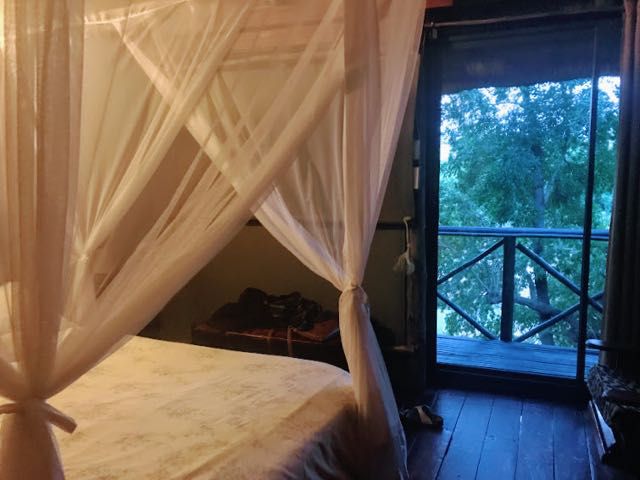
“I’d rather have a blood test to confirm strep throat and decide from there,” I told my doctor. And that is how I happened to get tested and confirmed with dengue. (The doctor ordered a broad blood test and was just as surprised as I was that it was positive for dengue).
The funny thing is, it was the suggestion of antibiotics that saved me.
That might leave you wondering – if the symptoms are changing, if you might not get all of the symptoms, and if they feel a lot like flu, how the hell are you supposed to know if you have dengue or not?
Below, I’ll give you some a walk through to what dengue fever was like for me. But first, here are my tips for what to do if you get dengue when you travel.
Why? Because for decades I’ve battled with mosquito bites. I’ve covered myself head to toe in 98% DEET and still manage to get bitten. Whether it’s on my eyelid, my hand (after I washed my hands before dinner, sending DEET down the sink) or hovering over a loo, my bare (non-sprayed) bottom exposed for just a minute. They always seem to find me. And short of actually bathing in a chemical that is so toxic it melts plastic, there’s little you can do.
It’s not dengue fever, I told myself. It couldn’t be. For a start, lying in my hotel room, windows closed and A/C off, body temperature normal, I didn’t have a fever.
One month post dengue
If you’re taking your own net, accept that you’re not going to be able to hang it much of the time. I don’t know about you, but I don’t know many hotels or hostels that will let you screw a fixing hook into the ceiling (even if you can reach that high) or wall. Most mosquito nets are designed for camping and fixing to nature or trees. I know this because I travelled with a net for a while and wasn’t able to successfully hang it once.
Yes, I’m being more cautious but having asked Doctor Dengue, “do I need to be paranoid now?” his answer was no. And that was my instinct too.
How to Make A Travel Insurance Claim
Dynamic Pricing – Flight Pricing’s Biggest Scam
All of the medical sites say get plenty of rest. They don’t give a medical reason why (but they also don’t explain why water is so vital during dengue). It’s probable there is a specific medical reason why rest is important. Otherwise, I think it’s commonly accepted that our bodies do the best recovery work when that’s all they have to do. Hence: lie down a lot.
But more seriously, I flipped through my mental diary. I was due to fly to Puerto Rico in 4 days. After that I was meeting a travel friend before bouncing on through the Caribbean for Christmas and New Year, under two weeks a way. A lot of plans had been made. A lot of money had been spent. I didn’t have time to be sick. And certainly not with something exotic.
- mostly you’re advised to cover at sunrise and sunset but while the the Aedes (Evil) mosquitoes does bite mostly in the early morning and early evening, it can bite throughout the day. In reality, you’re unlikely to want to wear thick, covering clothes all day in the heat.
- wearing long clothes does not give you full cover and protection. Mosquitoes will bite any bit of flesh and your face is the place you are least likely to want to put DEET. Yes, you’ll reduce your exposed flesh but I don’t think that matters to mosquitoes.
- mosquitoes can bite through some clothes – I’ve been bitten through leggings. You therefore need thick, loose cotton, linen or gym clothes, but you also need something that grips at the ankles, wait, wrists and neck. Do you know any clothes that fit that description besides jogging suits? Which brings me to…
- wearing long, all covering clothes in a tropical, humid location is simply not practical. If you’ve actually been to the tropics and experienced anything close to 80% humidity, I can tell you that you’ll take the risk of mosquitoes over heat exhaustion.
Fuck.
Still, my friend’s message had worried me enough so I turned to Dr Google –
At first, I let myself eat anything I thought I could manage. Very strangely for me, this included (half of) a McDonald’s Happy Meal – the last time I ate McDonalds can be measured in years rather than weeks. I had a strong hankering for beef generally (there was a spaghetti bolognese I consumed over 5 sittings). A few bites of sweetcorn from a can on the days I couldn’t stomach anything and, my saviour, the soups from a French bistro just up the road. Every day I forced a few pieces of fruit in me even if it meant making several attempts to eat an orange.
The week after the dengue is inactive
My advice: for a short trip, if you can find clothes that work for you, go for it. If you’re travelling long term and don’t want to pack lots of long, thick clothes, go with DEET.
What dengue was like for me
Oh.
Finally, being away from home, a third fear reared its head – I didn’t have access to a doctor that I knew. Was I going to pluck one off the internet and hope I could trust him or her? And then there was the language barrier. I was in Mexico. I have enough Spanish to conduct my life. But not enough to conduct an unknown illness.
- I started to feel under the weather about a week before the real dengue symptoms started. This doesn’t fit with the life cycle of dengue (below) as I would have been in the incubation stage. It could be unrelated but it also could have been my body giving me an early warning that a shit storm was a-coming.
- My under the weather symptoms started with a general feeling of tiredness that was consistent with getting a cold. My nose blocked up for a couple of days, my throat felt dry and I got a migraine, which I wrote off as a sinus headache. The headache passed within about 2-3 days (not uncommon for my migraines).
- By the end of that week, my body was really starting to ache. I put this down to the heavy workout schedule – I’d crammed in yoga, running and strength training on some days. By the end of the week I’d been for 2 massages, my aches were getting that bad.
I know that drinking lots of water can feel difficult for people who don’t regularly guzzle the clear stuff but you have to. Treat it like it is medicine because it is. I was drinking around 3-4 litres per day. Being in Mexico where the tap water isn’t drinkable, this was a huge chore because it meant I needed to carry a 5 litre container of water back to my room every day/every other day – not fun when your body is on fire. I also felt very isolated and alone having to deal with this without friends and family around to help. But what can you do? Fortunately, I was sufficiently paranoid and determined to get myself back to full health so I did my daily water trip and forced the fluids down.
- I moved hotel on the Monday and that’s when things went from bad to ‘I can’t move’. Based on the dengue life cycle, this is probably when the dengue kicked in. The muscle aches were no longer just sports aches. I was waking up to take pain pills in the middle of the night. In fact, feeling like I’d been taking paracetamol for too long, I moved to Naproxen, an NSAID that offers more hours of relief. This was a BAD move (more on that below).
- The best way I can describe my aches: it felt like someone had put an Allen key into my muscles and was winding and winding until my muscles felt like they were going to pop. On top of that, it felt like the top layer of my skin had been dipped in petrol/gasoline and been set on fire. Yet still, no fever.
- I don’t remember much of that week except that nausea had set in and every single smell made we want to vomit. I couldn’t manage food. The smell of tea and coffee made me want to puke. The air freshener in the lobby smelt like someone had dropped a putrid bottle of perfume. Even water seemed to have a scent that made me breathe in before I took a drink. Still, I’m not stupid. I know that we need liquid and fuel, more so when we are sick. So, I forced myself to eat. It was one of the hardest parts of dengue.
- Some time during that week I also noticed a rash. Good advice: if you look down at your skin and the words ‘I have a rash’ pop into your head, don’t let your logic talk you out of your instinct. You may not want to have a rash but your gut reaction is the right one.
- A word on dengue rash – I have not seen two pictures of dengue rash that are the same. Some are very severe with red dots. Some present with trails of lines if you run a fingernail over your skin. Mine was more subtle and mottled (picture below). Some people don’t get a rash at all.
- My friend mentioned dengue on Thursday, which is when I went to get tested. Dengue was confirmed. By that point, I was most of the way through the 7-day life of the symptoms.
- I had a blood test every day until the dengue finally showed up as inactive in my system. I was supposed to fly on the Monday after I was diagnosed but I couldn’t – my doctor hadn’t declared me fit to fly and even if I decided to go against his advice, I could barely get out of bed, let alone move country.
First of all fear that you’re wasting the doctor’s time – we all know that there is no treatment for cold and flu beyond ‘go home, rest and drink plenty of fluids’. And that’s probably what I had, right? A cold. Or flu.
- The dengue was finally declared dead (inactive) on the Monday when I was due to be in the air en route to Puerto Rico. My doctor told me to rest for 2-3 days more.
- Funnily enough, on the day the dengue died, my aches reduced but the dengue headache appeared. This also doesn’t fit with the standard way that dengue presents (but I’d still also not had a fever). That dengue headache hung around for a whole 7 days and was the worst part. As someone who suffers debilitating migraines that can send me to bed for days at a time, the dengue headache made my migraines feel like a relaxing scalp massage. It felt like someone was trying to pull my brain out of my eye using a blunt pair of tweezers.
- On day 3ADD (After Dengue Died) I packed up my stuff and made my way slowly, slowly, slowly towards Puerto Rico. Being sensible, I broke up the journey so that I travelled from Playa del Carmen to Cancun by private transfer and stayed overnight at an airport hotel. The next day I took two flights (no direct flight route exists) to Puerto Rico via Miami. I was then reunited with my travel friend and everything seemed easier after that.
- The week after dengue I was slow and weak as a kitten. Mostly I couldn’t see straight because of the blinding headache.
- The most terrifying symptom in the week after dengue was the bruising. I normally bruise like a peach and always have but this was extreme – I had a 1cm width bruise that ran across the entire width of my back from leaning back in a metal chair. The bruise lasted several days. I had a couple of other big bruises from knocks and bumps and I was seriously considering getting them checked by a doctor. Instead, my friend and I ended up doing a ‘check Jo for new bruises’ routine at the end of each day. Fortunately, after the back bruise from the chair, nothing else was as significant.
- A non-serious but still annoying symptom was severe skin dryness. From flaking skin to ultra dry hair to ears so dry I couldn’t get my earplugs in my ears, my body was parched.
When a dengue mosquito bites, the virus enters your white blood cells. The white blood cells respond by producing defensive proteins (e.g. cytokines). This is the process that gives you your symptoms. When the virus gets serious, fluid from the bloodstream leaks through the wall of small blood vessels into body cavities. As a result, less blood circulates in the blood vessels, and the blood pressure can become dangerously low. The virus can also impact bone marrow leading to a reduced numbers of platelets (needed for blood clotting) which is what puts you at risk of haemorrhaging.
- I’m now more that one month since dengue started and in that time I’ve had about 3-4 flare ups where the dengue muscle pains and burning skin sensation appear as well as a complete draining of energy. I’ve also had what looked like a rash twice. Each time, I’ve lay down, relaxed and by morning I’m back to normal again. There isn’t much online to tell me whether this is common but I recently met a girl who’d also had dengue in the past few months and she said she had the same problem.
- I had my first run a few weeks after dengue and it was tough going but I managed it. I was also back on my yoga mat, with significantly reduced strength and stamina about a week after dengue died. Two weeks after dengue I managed a couple of short hikes, including one in the El Yunque rain forest and one on the island of Curacao on Christmas Day.
- I do need to get better at slowing down and I’m trying to take dengue as a lesson. I’m otherwise hopeful I will have a good and strong recovery. My skin is still very dehydrated but I’m just applying body and hair oil. Some ladies reported significant hair loss in the months after dengue. Let’s hope not. I’ll keep this post updated if that changes. And yes, I’ll share photos if it comes to it :/
First of all, don’t panic. Secondly, stop taking them, and tell your doctor what you’ve been up to. I was doing exactly this and I turned out fine. After a week of taking paracetamol to no avail, I switched to some strong NSAIDs and had been taking them for a few days before I found out I had dengue. I told my doc, stopped taking them and didn’t have any complications because of it.
Want more travel tips? You might like some of my other posts…
Chances are you’re reading this article because you’re worried you might have dengue fever. In which case, you probably already have a fair idea of what it is. If not, dengue fever is a virus you can get if you’re bitten by certain (infected) mosquitoes – the Aedes mosquito to give them their formal name. I call them the Evil mosquitoes. I have a more detailed section below on what is dengue fever and dengue fever treatment.
Which is nothing short of foolish.
The advice: use essential oils, wrist bands, citronella candles, mosquito coils, plug-in repellent tabs or high frequency devices/apps

Don’t get me wrong, I gave serious thought to going back to my very non-tropical native England after I got dengue but am I realistically never going to leave home again? And even if I do, the chances are that mosquito illnesses are going to continue to spread as the world gets warmer. If I could stop that happening, I definitely would. But I can’t. And so I continue as I was before.
The incubation period (a week before the dengue symptoms appeared)
Most travellers have head of malaria and dengue fever. You’ve probably also heard of Zika – but that’s only bad for pregnant woman, right? (Wrong, it has some nasty consequences even if you’re not pregnant including the risk of triggering Guillain-Barré syndrome, neuropathy and myelitis in adults).
Like this guide to what to do when you get dengue when you travel? Share it on Pinterst…





